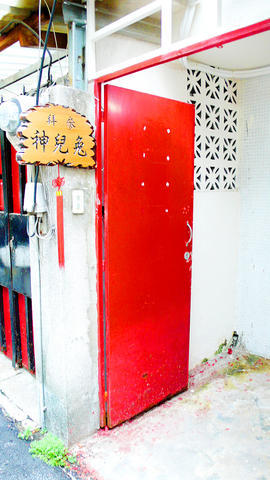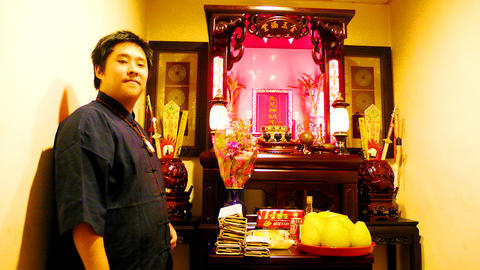On an overcast weekday afternoon, two men in their 20s walked into an unassuming temple nestled in an apartment building in Yonghe City (永和市). "We've been here before. We know the way," they told the priest's assistant, and proceeded to the altar on the second floor. A few minutes later, another young man went downstairs to have his fortune told by Lu Wei-ming (盧威明), a Taoist priest, or fashi (法師). Lu established and tends this shrine, known as the Rabbit Temple (兔兒廟), which is devoted to the rabbit deity (兔兒神) - the patron god of homosexuals.
The god isn't very well known, nor commonly worshipped, but he is based on an historical figure. According to the Tale of the Rabbit God that appears in the Zibuyu (子不語), a collection of supernatural stories written by Qing Dynasty scholar and poet Yuan Mei (袁枚, 1716-1798), Hu Tianbao (?#32993;天保) was an official in 18th-century, Qing Dynasty China. He fell in love with a handsome young imperial inspector of Fujian Province, but because of the inspector's higher status, Hu was afraid to reveal his feelings. After Hu was caught peeping at the inspector through a bathroom wall, he confessed his admiration for the inspector, who had him beaten to death. One month after his passing, the story goes, Hu appeared to a man from his hometown in a dream, claiming that the king of the underworld had appointed him the Rabbit God. As such, his duty was to govern the affairs of men who desire men. In the dream, he asked the man to erect a shrine to him.
As a priest, Lu often heard complaints from homosexual Taoist adherents that there was no god to answer their prayers. Believing one of his missions is to tend to the needs of people alienated from mainstream society, he set out to revive the forgotten deity. As his research suggests, Hu was an upper class historical figure who lived in Fujian from the late Ming Dynasty to the early Qing Dynasty. However, according to Michael Szonyi, associate professor of Chinese history at the department of East Asian Languages and Civilizations at Harvard, the Rabbit God is a pure invention of Yuan, the poet, since the image of the rabbit deity doesn't appear in any other sources from Fujian.

hotos: Ho Yi, Taipei Times
While some aspects of the story may be fabrications, the existence of the cult of Hu Tianbao in Fujian in the 18th century is well documented in official Qing records.
Historical Roots
In his Cult of Hu Tianbao and the 18th-Century Discourse of Homosexuality, which was published in the journal Late Imperial China in 1998, Szonyi discusses the evidence used by the government in its campaign against religious sects. The evidence was given by Zhu Gui (朱珪, 1731-1807), a grain tax who described the iconology of the cult as "two men embracing one another; the face of one is somewhat hoary with age, the other tender and pale." He went on to say that adherents, "on seeing young men desire to have intercourse with them, prayed for assistance from the plaster idol … . Afterwards they plastered the idol's mouth with pork intestine and sugar in thanks."

Photo: Ho Yi, Taipei Times
Later official records suggest that the sect was active in the 19th century, but as Szonyi points out, the chief evidence comes from edicts of imperial officials who tried to suppress the practice, therefore it is impossible to ascertain how the god was perceived from its adherents' point of view.
Lu says that "The deity can be seen as an alternative to Yue Xia Lao Ren (月下老人) [the matchmaker god]. I usually advise gay temple-goers not to go to Yu Lao, [the nickname of the matchmaker god], since love affairs between men and women are believed to be his responsibility. He will be confused by homosexuals' prayers and probably say to himself: 'The prayer doesn't seem right. I'll match you with a woman instead.'"
The Rabbit God is perceived to be an affable deity, Lu said, who is willing to assist his followers in every aspect of life. Since he works for Cheng Huang (城隍), the City God, he has both the erudition and social network in the spiritual world to solve any problem mortals have, according to Lu.
Homosexuals may have an edge in the spiritual world because, "Hu Tianbao is rather self-abased both because of the way he died and the somewhat belittling title of rabbit. So if you are willing to believe in him, he will be much more grateful and work harder than other deities," Lu said.
There are several methods of worshipping, asking for and receiving answers from this divine being, but sincerity is what counts most, Lu said. For this reason, followers should address the god as Ta Yeh (大爺), or master, rather than Rabbit God. Then, those with needs can write down their names, addresses, birthdays and prayers on pieces of paper money and burn them to make sure the messages are sent to heaven.
In another form of worship, personal items can be brought before the alter for Ta Yeh's blessings. Some followers believe that blessed skin-care products are more effective and increase the likelihood of romance. Followers can also take fu (符), paper charms, from the temple, place them under a pillow and pray to the deity to fulfill their wishes before going to bed. To Lu, the praying is meant to encourage contemplation.
sacred to secular
That is the spiritual side of the sect, but Lu is also concerned about the status of homosexuals in society, and that is a major reason for establishing the temple. "Religions both in the West and the East have long pushed the homosexual community into the margin," he said. "But providence is benign, and love is given to all human beings as equals." He also added that the temple is not merely for gay men, but lesbians as well.
Lu is planning religious gay weddings. He wants to deliver a message that religion recognizes the union of homosexual couples, and there is no reason why the state shouldn't do the same.
To a 25-year-old adherent - who requested to be identified as Philippe since his colleagues don't know he is gay - the temple offers a source of comfort in time of trouble. Admitting that he imagined the shrine would be a bit gruesome before the visit, Philippe noted that the whole experience was similar as that of visiting any other temple.
"Although I had a secular upbringing, I still feel the need to seek out comfort in religious faith, to know there is hope I can hold on to, a true love that is not far off," said the young internist, who said he would return to the shrine and give thanks to Ta Yeh if the dinner date after the gay parade last Saturday developed into a long-yearned-for relationship.

Three big changes have transformed the landscape of Taiwan’s local patronage factions: Increasing Democratic Progressive Party (DPP) involvement, rising new factions and the Chinese Nationalist Party’s (KMT) significantly weakened control. GREEN FACTIONS It is said that “south of the Zhuoshui River (濁水溪), there is no blue-green divide,” meaning that from Yunlin County south there is no difference between KMT and DPP politicians. This is not always true, but there is more than a grain of truth to it. Traditionally, DPP factions are viewed as national entities, with their primary function to secure plum positions in the party and government. This is not unusual

Mongolian influencer Anudari Daarya looks effortlessly glamorous and carefree in her social media posts — but the classically trained pianist’s road to acceptance as a transgender artist has been anything but easy. She is one of a growing number of Mongolian LGBTQ youth challenging stereotypes and fighting for acceptance through media representation in the socially conservative country. LGBTQ Mongolians often hide their identities from their employers and colleagues for fear of discrimination, with a survey by the non-profit LGBT Centre Mongolia showing that only 20 percent of people felt comfortable coming out at work. Daarya, 25, said she has faced discrimination since she

More than 75 years after the publication of Nineteen Eighty-Four, the Orwellian phrase “Big Brother is watching you” has become so familiar to most of the Taiwanese public that even those who haven’t read the novel recognize it. That phrase has now been given a new look by amateur translator Tsiu Ing-sing (周盈成), who recently completed the first full Taiwanese translation of George Orwell’s dystopian classic. Tsiu — who completed the nearly 160,000-word project in his spare time over four years — said his goal was to “prove it possible” that foreign literature could be rendered in Taiwanese. The translation is part of

April 21 to April 27 Hsieh Er’s (謝娥) political fortunes were rising fast after she got out of jail and joined the Chinese Nationalist Party (KMT) in December 1945. Not only did she hold key positions in various committees, she was elected the only woman on the Taipei City Council and headed to Nanjing in 1946 as the sole Taiwanese female representative to the National Constituent Assembly. With the support of first lady Soong May-ling (宋美齡), she started the Taipei Women’s Association and Taiwan Provincial Women’s Association, where she